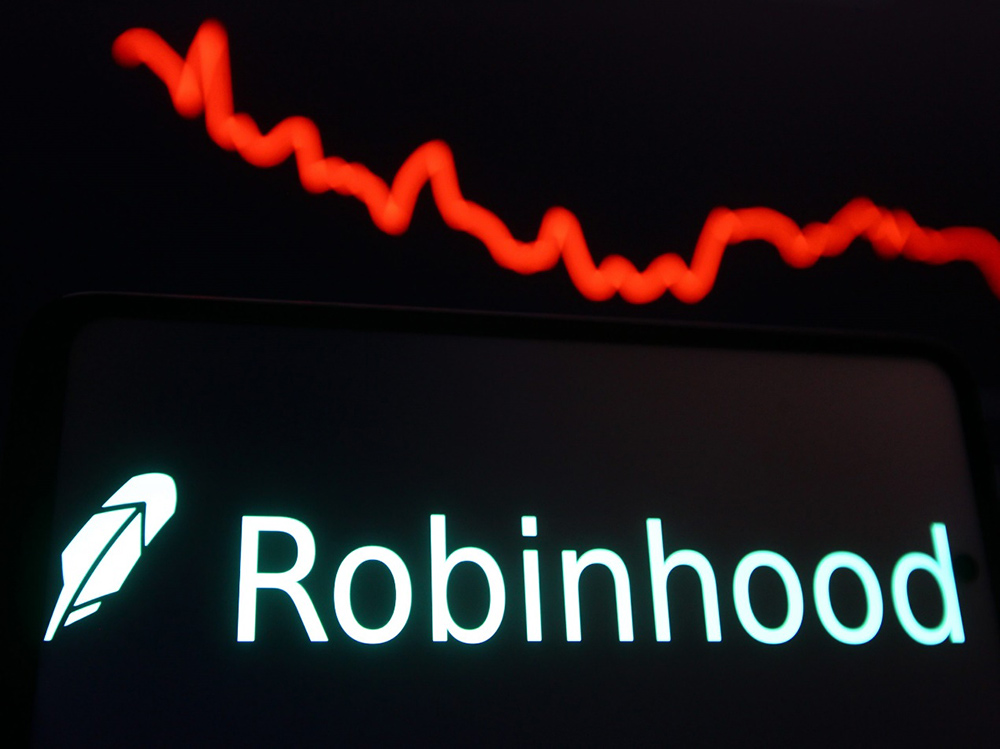
一個(gè)多世紀(jì)以前,,北大西洋上發(fā)生了在和平時(shí)代航海史上最為慘重的一次災(zāi)難——“泰坦尼克號(hào)”沉沒,。當(dāng)時(shí),這艘船是有史以來最大,、最先進(jìn)的商業(yè)船舶,。來自世界各地的乘客都希望乘坐這艘海洋科技史上的偉大奇跡,體驗(yàn)一次跨大西洋航行,。
泰塔尼克號(hào)號(hào)稱永不沉沒,,但事實(shí)并非如此。在這艘船最終撞上一座冰山之前,,船員們收到了至少六次有關(guān)冰山的警告,。當(dāng)泰坦尼克號(hào)開始沉沒時(shí),被永不沉沒的說法欺騙的無辜乘客們才發(fā)現(xiàn),,這艘排水量達(dá)45,000噸的“夢想之船”所配備的救生艇只能供一半乘客使用,。
結(jié)果是在2,224名乘客中,有1,500人不幸遇難,,其中超過一半是三等艙乘客,。泰坦尼克號(hào)的經(jīng)營者白星航運(yùn)公司(White Star Line)在事后遭遇訴訟,案件一直上訴至美國最高法院(U.S. Supreme Court),。經(jīng)過漫長的審理,,白星航運(yùn)最終支付了66.4萬美元(相當(dāng)于今天的1,800萬美元),達(dá)成和解,。
今天正在爭搶在線交易市場份額的經(jīng)紀(jì)商們,,可以從這場悲劇中得到許多教訓(xùn)。Robinhood就是很好的例子,。這在眼下尤其重要,,因?yàn)檫@家公司正準(zhǔn)備上市。
Robinhood知道或者本應(yīng)該知道,,前方有一座“資本的冰川”,,但它依舊在邀請(qǐng)人們“登船”,甚至通過提供“免費(fèi)股”來吸引潛在投資者,。
今年早些時(shí)候,,大量散戶(許多人系首次進(jìn)行股票投資)蜂擁至Robinhood平臺(tái),參與交易游戲驛站(GameStop)和AMC娛樂公司(AMC Entertainment)等所謂的“網(wǎng)紅股”,。這些股票的價(jià)格隨之飆升,,迫使做空這些股票的大型投資機(jī)構(gòu)回補(bǔ)空頭,買入股票。Robinhood平臺(tái)上的交易量激增,,資金賬戶大幅增加,。
2021年1月28日上午,該公司重重地撞上了眾所周知的冰山,,并厚顏無恥地限制13只股票“只能進(jìn)行平倉”交易,。突然之間,投資者通過Robinhood賬戶只能持有或出售游戲驛站的股票,;但被禁止購買股票,。Robinhood的交易限制,導(dǎo)致認(rèn)購需求減少,,受限制股票價(jià)格也隨之下跌,,但其客戶卻只能眼睜睜看著他們的投資組合暴跌。
Robinhood的客戶沒有“救生艇”,,投資者的大量收益成了泡影,。另一方面,一些“頭等艙乘客”卻順利上岸,,比如持有大量空頭的機(jī)構(gòu),。
散戶們憤怒不已。雖然該公司的首席執(zhí)行官向美國消費(fèi)者新聞與商業(yè)頻道(CNBC)表示,,限制措施是“先發(fā)制人”和“正常操作”,,但對(duì)該公司提起的集體訴訟很快就達(dá)到數(shù)十起。大多數(shù)人所說的“網(wǎng)紅股狂潮”在法院中被稱為“2021年1月空頭擠兌交易訴訟”,,包括在美國各地提起的55起訴訟,。(筆者是法院任命的原告指導(dǎo)委員會(huì)四名律師之一,負(fù)責(zé)處理針對(duì)Robinhood和其他經(jīng)紀(jì)商提起的跨區(qū)訴訟,。)
Robinhood對(duì)其行為列舉了許多毫無說服力的理由,。不過,只有一條貌似合理:它需要滿足清算所的保證金要求,,這意味著Robinhood需要在交易清算所中存入足夠的保證金,,才可以繼續(xù)處理交易。
但清算所的要求并不新鮮,,泰坦尼克號(hào)撞上的冰山也并非突然出現(xiàn),。就在Robinhood做出限制交易的可疑決定前幾天,Robinhood在蘋果公司(Apple)的應(yīng)用商店(App Store)一度飆升到排行榜首位,,當(dāng)時(shí)它就清楚清算所的規(guī)則,。它知道,大量增加的應(yīng)用程序下載量是源于在社交媒體上興起的網(wǎng)紅股狂潮,,也就是它最終限制交易的股票,。
但Robinhood并沒有停止廣告宣傳或者提供免費(fèi)股,,來增加用戶參與,。它還在繼續(xù)銷售船票,,等到它魂斷海上那一天,乘客們只能眼睜睜看著它沉沒,。
監(jiān)管者已經(jīng)注意到了風(fēng)險(xiǎn),,Robinhood的投資者以及考慮投資該市場的人們也應(yīng)該引起重視。自去年12月以來,,Robinhood共向美國證券交易委員會(huì)(SEC)和美國金融業(yè)監(jiān)管局(Financial Industry Regulatory Authority)支付了大約1.35億美元,,用于和解與其大量使用訂單流付款(即公司將交易引流給其他機(jī)構(gòu)進(jìn)行處理并從中獲得報(bào)酬)誤導(dǎo)客戶、應(yīng)用宕機(jī)和未履行最佳執(zhí)行義務(wù)(即經(jīng)紀(jì)商必須盡量以對(duì)客戶最有利的方式執(zhí)行客戶的交易)等有關(guān)的訴訟,。與此同時(shí),,Robinhood在美國各地方法院中辯護(hù)稱,它只對(duì)客戶承擔(dān)最低受托責(zé)任,。
監(jiān)管部門似乎日益關(guān)注Robinhood的狀況,,但這并沒有引起散戶們同等程度的擔(dān)憂。Robinhood第一季度收入5.22億美元,,是去年的四倍以上,,其資金賬戶(1,800萬,并且仍然在持續(xù)增加)比去年同期翻了一番以上,?;蛟S是“免費(fèi)交易”令投資者們對(duì)危險(xiǎn)視而不見,但散戶們應(yīng)該開始問問自己:這個(gè)平臺(tái)對(duì)客戶的資金不提供任何保護(hù),,還反復(fù)聲稱其對(duì)客戶只有最低法定義務(wù),,同時(shí)卻鼓吹自己“代表普通投資者”,他們是否做好了在這樣一個(gè)平臺(tái)上交易的準(zhǔn)備,?(財(cái)富中文網(wǎng))
本文作者莫里斯?D?佩薩是佩薩律師事務(wù)所(Pessah Law Group)的創(chuàng)始人,。
翻譯:劉進(jìn)龍
審校:汪皓
一個(gè)多世紀(jì)以前,北大西洋上發(fā)生了在和平時(shí)代航海史上最為慘重的一次災(zāi)難——“泰坦尼克號(hào)”沉沒,。當(dāng)時(shí),,這艘船是有史以來最大、最先進(jìn)的商業(yè)船舶,。來自世界各地的乘客都希望乘坐這艘海洋科技史上的偉大奇跡,,體驗(yàn)一次跨大西洋航行。
泰塔尼克號(hào)號(hào)稱永不沉沒,,但事實(shí)并非如此,。在這艘船最終撞上一座冰山之前,船員們收到了至少六次有關(guān)冰山的警告,。當(dāng)泰坦尼克號(hào)開始沉沒時(shí),,被永不沉沒的說法欺騙的無辜乘客們才發(fā)現(xiàn),,這艘排水量達(dá)45,000噸的“夢想之船”所配備的救生艇只能供一半乘客使用。
結(jié)果是在2,224名乘客中,,有1,500人不幸遇難,,其中超過一半是三等艙乘客。泰坦尼克號(hào)的經(jīng)營者白星航運(yùn)公司(White Star Line)在事后遭遇訴訟,,案件一直上訴至美國最高法院(U.S. Supreme Court),。經(jīng)過漫長的審理,白星航運(yùn)最終支付了66.4萬美元(相當(dāng)于今天的1,800萬美元),,達(dá)成和解,。
今天正在爭搶在線交易市場份額的經(jīng)紀(jì)商們,可以從這場悲劇中得到許多教訓(xùn),。Robinhood就是很好的例子,。這在眼下尤其重要,因?yàn)檫@家公司正準(zhǔn)備上市,。
Robinhood知道或者本應(yīng)該知道,,前方有一座“資本的冰川”,但它依舊在邀請(qǐng)人們“登船”,,甚至通過提供“免費(fèi)股”來吸引潛在投資者,。
今年早些時(shí)候,大量散戶(許多人系首次進(jìn)行股票投資)蜂擁至Robinhood平臺(tái),,參與交易游戲驛站(GameStop)和AMC娛樂公司(AMC Entertainment)等所謂的“網(wǎng)紅股”,。這些股票的價(jià)格隨之飆升,迫使做空這些股票的大型投資機(jī)構(gòu)回補(bǔ)空頭,,買入股票,。Robinhood平臺(tái)上的交易量激增,資金賬戶大幅增加,。
2021年1月28日上午,,該公司重重地撞上了眾所周知的冰山,并厚顏無恥地限制13只股票“只能進(jìn)行平倉”交易,。突然之間,,投資者通過Robinhood賬戶只能持有或出售游戲驛站的股票;但被禁止購買股票,。Robinhood的交易限制,,導(dǎo)致認(rèn)購需求減少,受限制股票價(jià)格也隨之下跌,,但其客戶卻只能眼睜睜看著他們的投資組合暴跌,。
Robinhood的客戶沒有“救生艇”,投資者的大量收益成了泡影,。另一方面,,一些“頭等艙乘客”卻順利上岸,,比如持有大量空頭的機(jī)構(gòu)。
散戶們憤怒不已,。雖然該公司的首席執(zhí)行官向美國消費(fèi)者新聞與商業(yè)頻道(CNBC)表示,,限制措施是“先發(fā)制人”和“正常操作”,但對(duì)該公司提起的集體訴訟很快就達(dá)到數(shù)十起,。大多數(shù)人所說的“網(wǎng)紅股狂潮”在法院中被稱為“2021年1月空頭擠兌交易訴訟”,,包括在美國各地提起的55起訴訟,。(筆者是法院任命的原告指導(dǎo)委員會(huì)四名律師之一,,負(fù)責(zé)處理針對(duì)Robinhood和其他經(jīng)紀(jì)商提起的跨區(qū)訴訟。)
Robinhood對(duì)其行為列舉了許多毫無說服力的理由,。不過,,只有一條貌似合理:它需要滿足清算所的保證金要求,這意味著Robinhood需要在交易清算所中存入足夠的保證金,,才可以繼續(xù)處理交易,。
但清算所的要求并不新鮮,泰坦尼克號(hào)撞上的冰山也并非突然出現(xiàn),。就在Robinhood做出限制交易的可疑決定前幾天,,Robinhood在蘋果公司(Apple)的應(yīng)用商店(App Store)一度飆升到排行榜首位,當(dāng)時(shí)它就清楚清算所的規(guī)則,。它知道,,大量增加的應(yīng)用程序下載量是源于在社交媒體上興起的網(wǎng)紅股狂潮,也就是它最終限制交易的股票,。
但Robinhood并沒有停止廣告宣傳或者提供免費(fèi)股,,來增加用戶參與。它還在繼續(xù)銷售船票,,等到它魂斷海上那一天,,乘客們只能眼睜睜看著它沉沒。
監(jiān)管者已經(jīng)注意到了風(fēng)險(xiǎn),,Robinhood的投資者以及考慮投資該市場的人們也應(yīng)該引起重視,。自去年12月以來,Robinhood共向美國證券交易委員會(huì)(SEC)和美國金融業(yè)監(jiān)管局(Financial Industry Regulatory Authority)支付了大約1.35億美元,,用于和解與其大量使用訂單流付款(即公司將交易引流給其他機(jī)構(gòu)進(jìn)行處理并從中獲得報(bào)酬)誤導(dǎo)客戶,、應(yīng)用宕機(jī)和未履行最佳執(zhí)行義務(wù)(即經(jīng)紀(jì)商必須盡量以對(duì)客戶最有利的方式執(zhí)行客戶的交易)等有關(guān)的訴訟。與此同時(shí),,Robinhood在美國各地方法院中辯護(hù)稱,,它只對(duì)客戶承擔(dān)最低受托責(zé)任。
監(jiān)管部門似乎日益關(guān)注Robinhood的狀況,,但這并沒有引起散戶們同等程度的擔(dān)憂,。Robinhood第一季度收入5.22億美元,,是去年的四倍以上,其資金賬戶(1,800萬,,并且仍然在持續(xù)增加)比去年同期翻了一番以上,。或許是“免費(fèi)交易”令投資者們對(duì)危險(xiǎn)視而不見,,但散戶們應(yīng)該開始問問自己:這個(gè)平臺(tái)對(duì)客戶的資金不提供任何保護(hù),,還反復(fù)聲稱其對(duì)客戶只有最低法定義務(wù),同時(shí)卻鼓吹自己“代表普通投資者”,,他們是否做好了在這樣一個(gè)平臺(tái)上交易的準(zhǔn)備,?(財(cái)富中文網(wǎng))
本文作者莫里斯?D?佩薩是佩薩律師事務(wù)所(Pessah Law Group)的創(chuàng)始人。
翻譯:劉進(jìn)龍
審校:汪皓
Over a century ago, one of the deadliest peacetime disasters in maritime history occurred in the North Atlantic Ocean—the sinking of the Titanic. At the time, the ship was one of the largest and most advanced commercial vessels ever built. Patrons from across the world swarmed to experience a transatlantic crossing on this behemoth marvel of maritime technology.
The Titanic was regarded as unsinkable, but it wasn’t. Before the ship’s untimely collision with an iceberg, its crew received at least six warnings about—you guessed it—icebergs. When the Titanic began to sink, innocent passengers duped by the narrative of unsinkability would learn that the 45,000-ton “ship of dreams” only had enough lifeboats for half of its 2,224 passengers.
The result: a 1,500-person body count, of which more than half were “third-class” passengers. Lawsuits followed, and after a lengthy legal battle that reached the U.S. Supreme Court, the Titanic’s operator, White Star Line, settled the claims for $664,000 (about $18 million today).
Many lessons can be drawn from this tragedy, some of which are relevant to today’s brokerages jockeying for their piece of online trading market share. Robinhood is a case in point. This is especially important now, as the company prepares to go public.
Robinhood knew, or should have known, that a capital iceberg was on the horizon, but it kept inviting people to sail on its ship and even offered “free stock” to entice would-be investors.
Earlier this year, retail investors (many investing for the first time) poured into Robinhood’s app to trade in so-called “meme stocks” like GameStop and AMC Entertainment. This sent prices in the securities soaring, forcing large institutions with short positions to cover their bets and pay up. The volume in trading on Robinhood’s platform spiked, and the company experienced a meteoric rise in funded accounts.
Then, on the morning of Jan. 28, 2021, the company slammed into the proverbial iceberg and brazenly restricted trading in 13 securities to “position closing only.” Suddenly, the only thing you could do with GameStop on your Robinhood account was hold or sell; buying was prohibited. Robinhood clients watched as the value of their portfolios plummeted due to the only effect that the brokerage’s restrictions could have: a decrease in buying demand, and, correspondingly, a decrease in share price of the restricted securities.
There was no lifeboat for Robinhood clients, and an unspeakable amount of investor gains were erased. On the other hand, some first-class passengers—institutions holding significant short positions, for example—did make it ashore.
Retail investors were furious, and although the company’s CEO insisted to CNBC that the restrictions were “preemptive” and part of “normal operations,” dozens of class-action lawsuits swiftly followed. Today, what most people refer to as the “meme stock frenzy” is known in court as the In Re January 2021 Short Squeeze Trading Litigation, a consolidation of 55 lawsuits from across the country. (I am one of four lawyers on a court-appointed plaintiffs’ steering committee handling the multi-district litigation against Robinhood and other brokers.)
Robinhood advanced numerous lackluster justifications for its actions. Only one seemed remotely reasonable: namely, the need to satisfy clearinghouse deposit requirements—which essentially means Robinhood needed to deposit more money with trading clearinghouses in order to be allowed to continue processing trades.
But clearinghouse requirements are nothing new, and neither are icebergs. Robinhood knew it was subject to clearinghouse rules when it soared to number one on the App Store in the days leading up to its dubious decision to restrict trading. It knew that the influx of users downloading its app was due to the frenzy that was being whipped up on social media around the very securities it eventually restricted.
Yet Robinhood did not stop advertising or offering free stock to increase user engagement. It kept selling tickets to the voyage, and then, when it couldn’t make it across the ocean, its passengers watched as the ship went down.
Regulators have taken note, and so should Robinhood investors and those thinking of investing in the market. Since December, the company has paid about $135 million in collective settlements to the SEC and Financial Industry Regulatory Authority (FINRA) for allegations that it misled customers about its prominent use of payment for order flow (in which firms are compensated for directing trades to other institutions for processing), outages on its app, and its failure to satisfy its duty of best execution (which means the broker must attempt to execute a customer’s trade in the way that is most advantageous to the customer). Meanwhile, Robinhood continues to argue in courts around the country that it owes minimal fiduciary duties to its clients.
While regulators seem increasingly concerned, retail investors have not all reacted with the same level of worry. Robinhood’s $522 million first quarter revenue is more than four times what it was last year, and its funded accounts (18 million and counting) more than doubled in that same period. Perhaps it is the allure of “free trades” that causes investors to turn a blind eye, but retail investors should start asking themselves if they are prepared to trade on a platform that offers zero protection for their money, and argues repeatedly that it owes minimal legal duties to its clients while it says it “stands for everyday investors.”
Maurice D. Pessah is the founder of Pessah Law Group.






